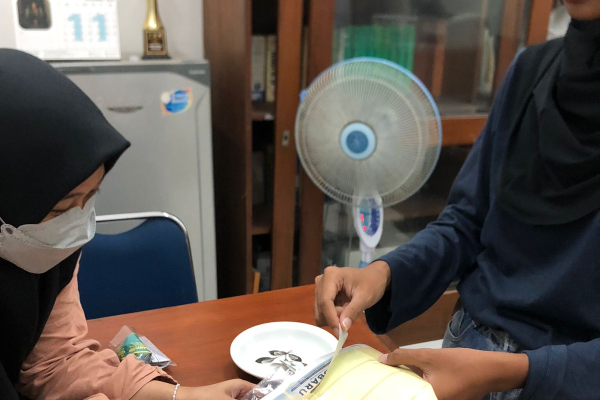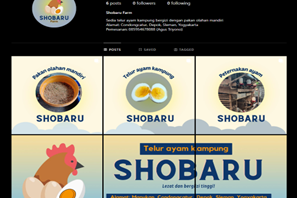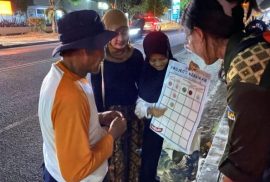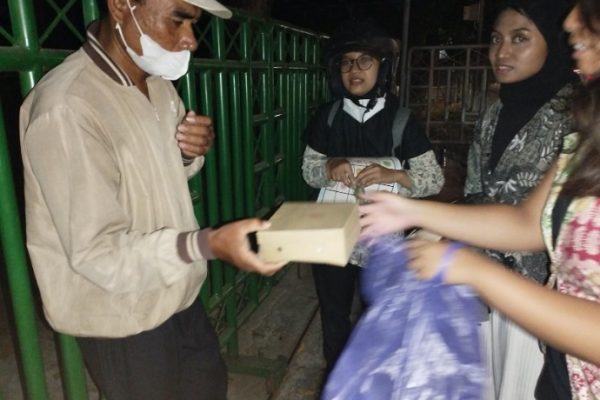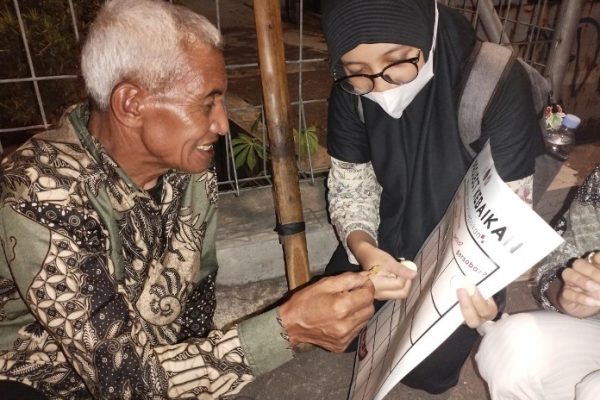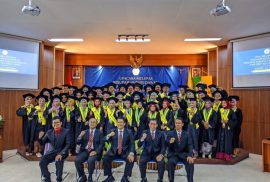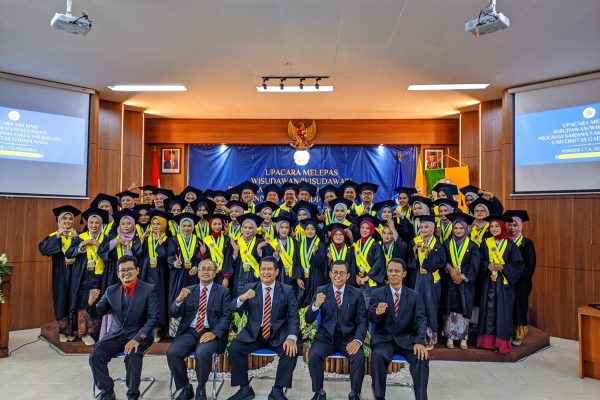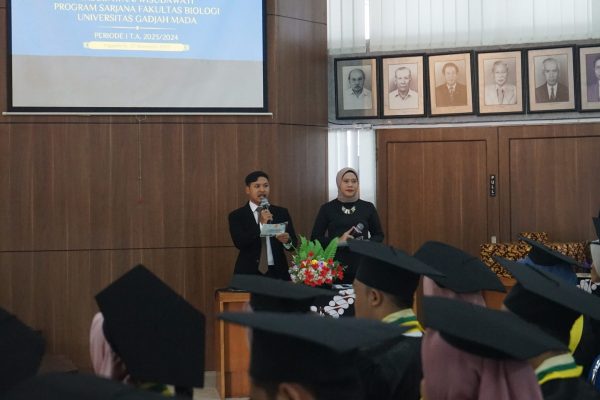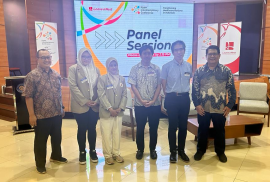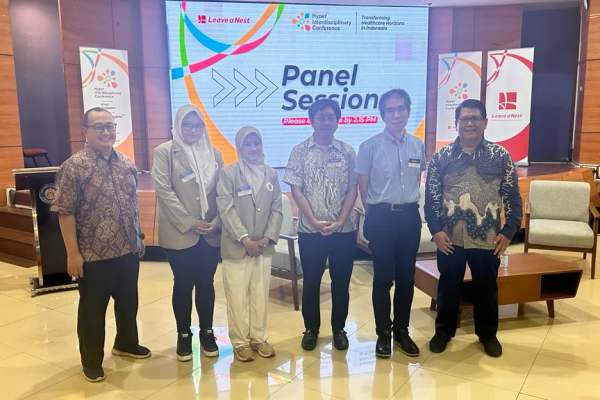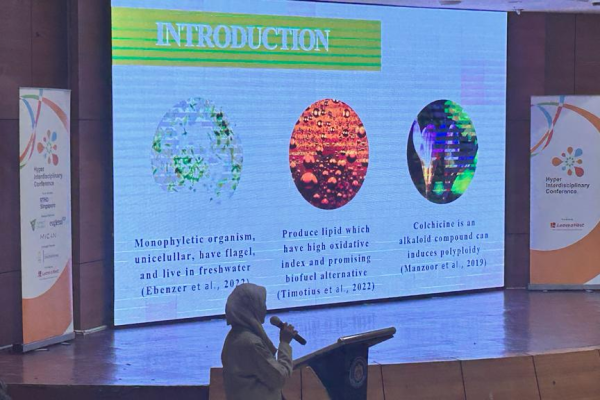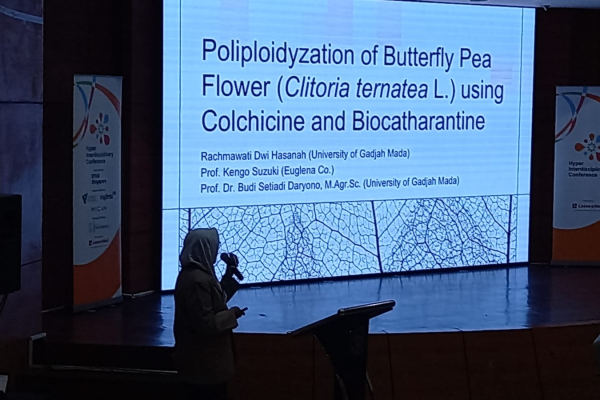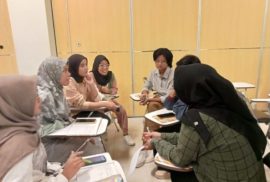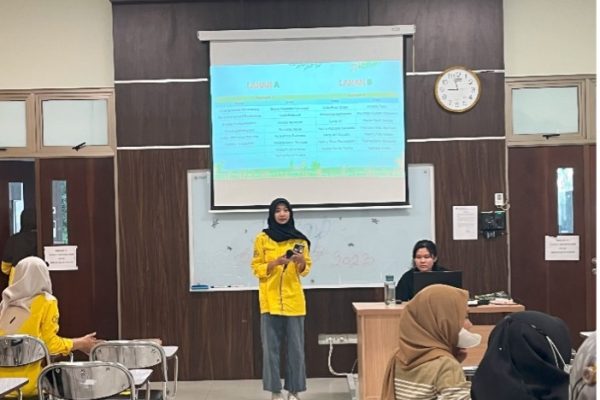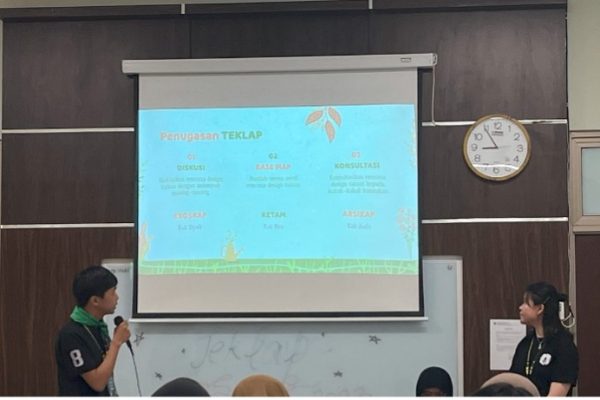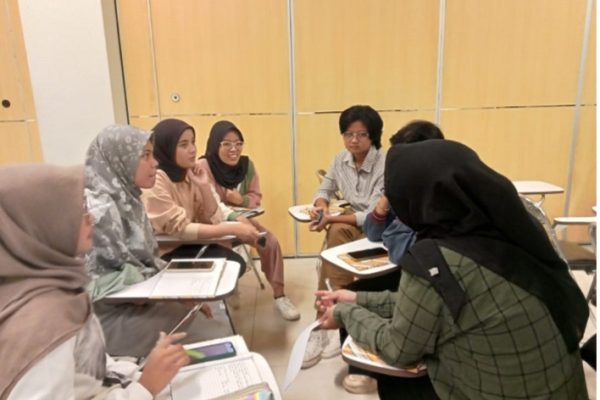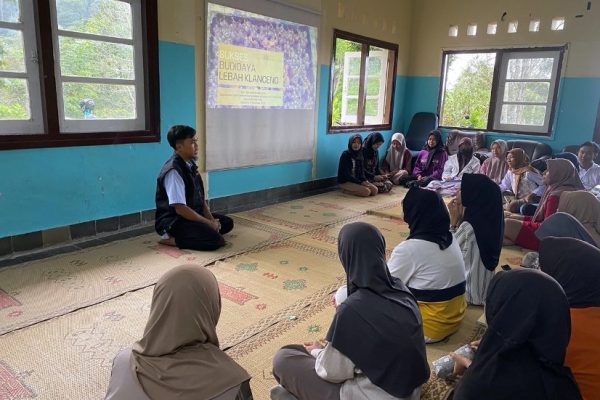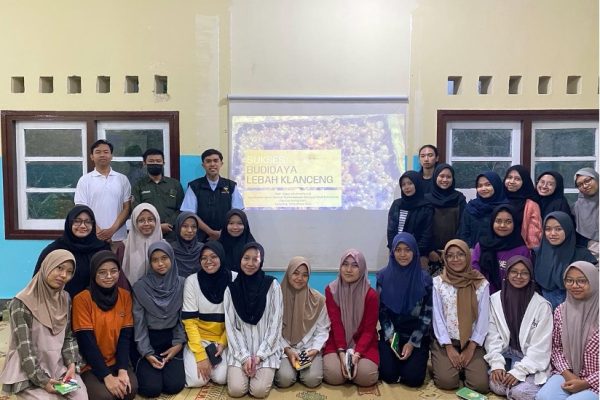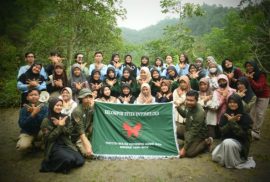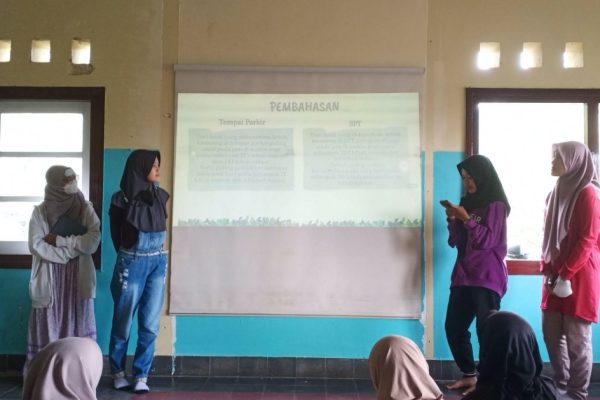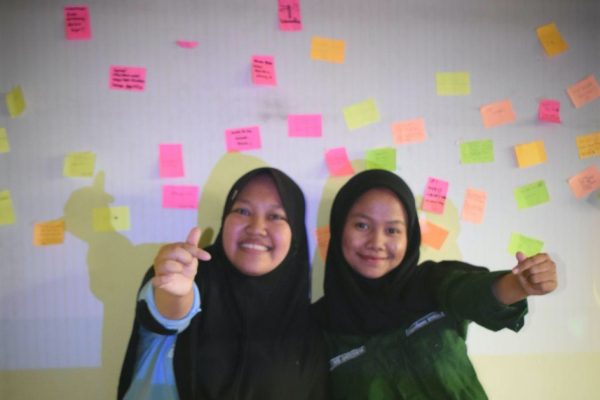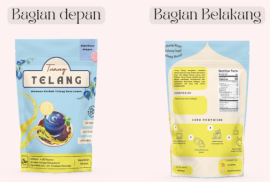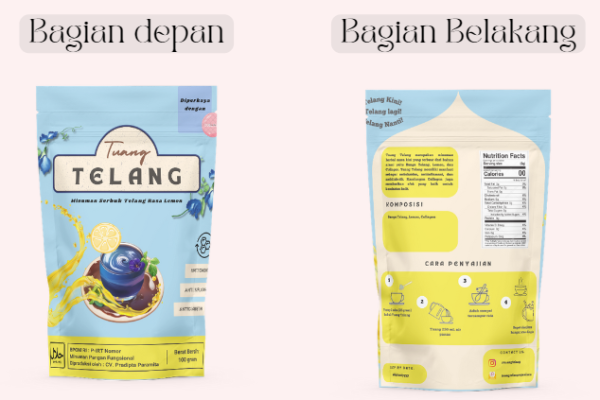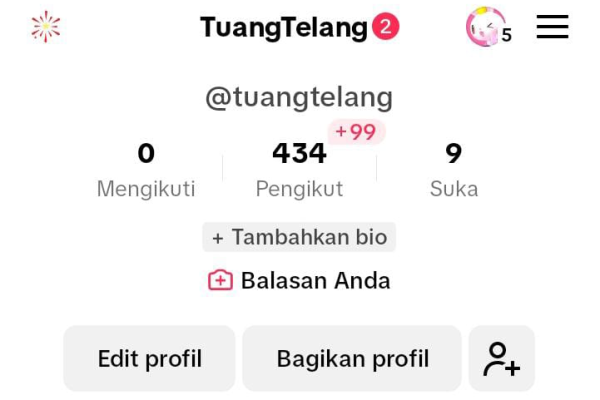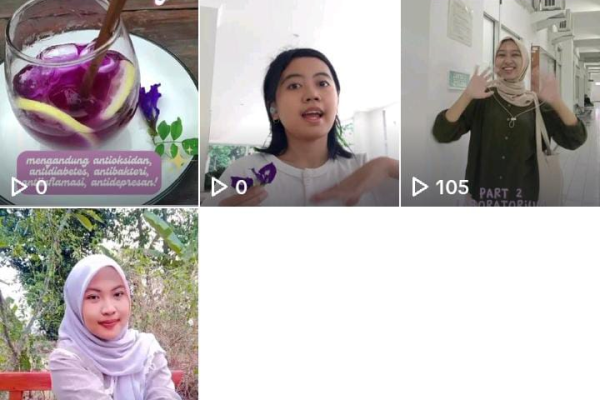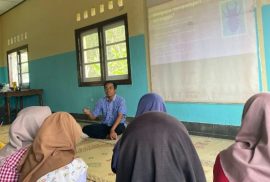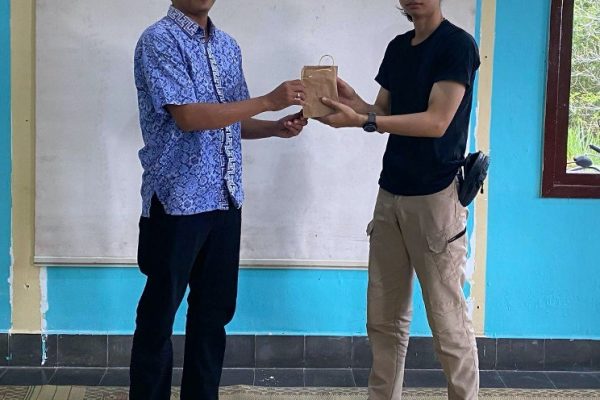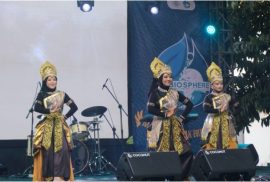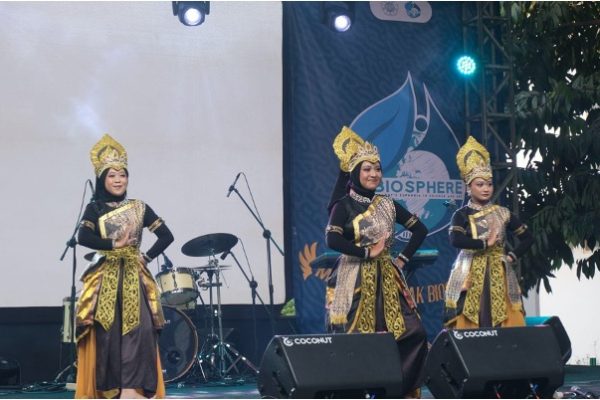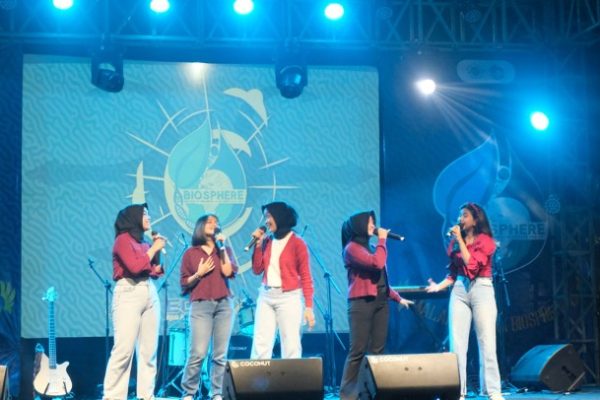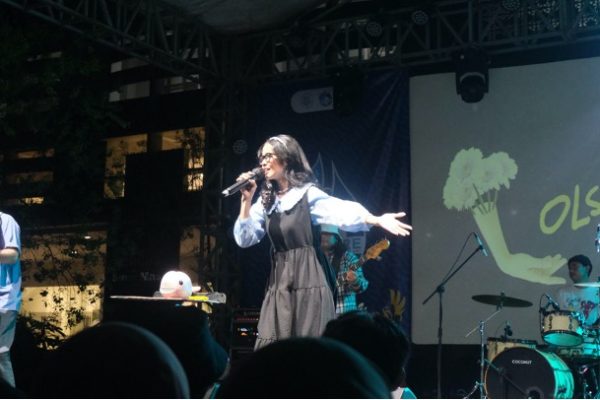Arsip:
Student Activities
[MBKM-PkM] The Independent Learning Independent Campus (MBKM) Community Service Program team from the Faculty of Biology, UGM, led by Prof. Dr. Endah Retnaningrum, M.Eng., along with four students Avila Kusuma W, Daimeera Anja, Shanaz Dhiya’ul Haq, and Syahidina has been conducting socialization and mentoring sessions with “Shobaru” livestock farmers in Condong Catur Village, Sleman, Yogyakarta, from October to November 2023.
The mentoring aimed to improve the quality of the local chicken eggs through the provision of fermented feed. The quality of these eggs is enhanced compared to those from non-fermented feed. The local chicken eggs have a richer taste and a stronger yolk color due to their high β-carotene content. This improvement is attributed to the higher nutritional content and better digestibility of fermented feed for the poultry. Moreover, providing fermented feed increases the animals’ appetite while reducing the odor from their waste. Additionally, fermented feed serves as a cost-effective alternative to commercial feed, which tends to be more expensive. The team also conducted socialization and mentoring on branding and online marketing of the local chicken eggs through social media platforms, including guidance on managing social media accounts. Packaging the local chicken eggs with branding has expanded their market reach, allowing consumers to locate and contact the local chicken egg farmers, thereby increasing the product’s visibility.
Through the MBKM Community Service activities by the Faculty of Biology, UGM, the “Shobaru” livestock farmers have seen improvements in both the quality of their egg products and their marketing strategies. This has led to sustained economic prosperity for the community while also contributing to environmental preservation.
On Saturday, October 28, 2023, coinciding with the commemoration of Youth Pledge Day, the Department of Social Affairs of the Biology Student Executive Board (BEM Biologi UGM) alongside the Biology Orchid Study Club (BiOSC) held a Youth Pledge Day commemoration through the ‘Project Kindness’ activity. The Project Kindness initiative is a social affairs program aimed at sharing kindness with those in need. The event included food distribution, a sharing session about Youth Pledge Day, and concluded with affixing stickers on distributed posters. Project Kindness took place at several locations around UGM, namely at the Biology Forest Roundabout, Selokan Mataram, Sekolah Vokasi, and Gejayan.
The event was organized by a team of 21 individuals, comprising 14 members from BEM Biologi and 10 from BiOSC. Additionally, there were 40 participants of various ages, ranging from adults to seniors. Project Kindness 2023 was conducted from 5:20 PM to 8:00 PM WIB. The opening commenced at 6:00 PM WIB, led by Aulia Robiatul as the Field Coordinator. The event began with greetings, introductions, and an opening prayer. It proceeded with groups moving from the faculty to their respective target locations, dividing into 3 groups, each accompanied by representatives from BEM Biologi and BiOSC, distributing food to those in need around UGM. Following this, there was a sharing session commemorating Youth Pledge Day, discussing aspirations for the young generation of Indonesia. The event concluded with a group documentation session involving both participants and organizers. The conclusion of this event aims to provide kindness to those in need and stands as a social initiative by BEM Biologi and BiOSC in commemorating Youth Pledge Day. [Author: BEM]
Wednesday, 22 November 2023 The Faculty of Biology, Universitas Gadjah Mada, held a Graduation Ceremony for the Bachelor Program 2023/2024 period I at the Tropical Biology Auditorium, Faculty of Biology. This ceremony was held at 01.00 p.m. and was opened by the Dean of the Faculty of Biology Prof. Dr. Budi Setyadi Daryono, M.Agr.Sc. and continued singing Indonesia Raya, Hymne Gadjah Mada, and Mars Faculty of Biology.
Then, there is a report of graduates by the Head of Undergraduate Study Program by Mr. Sukirno, S.Si., M.Sc., Ph.D. In his report he said that there were 45 graduates in this period with the academic title Sarjana sains or Bachelor of Science with Honours. Then, the highest GPA was obtained by Bunga Finovel Angellya, S.Si. with a value of 3,90. One of graduates who received the Bachelor of Science with Honours title is Faizah Diah Retnowati B.Sc Hons.
Next, there is a reading of the graduates graduation results. Furthermore, there was a speech by representatives of the graduates Bunga Finovel Angellya, S.Si. . She congratulated their fellow graduates and encouraged them to reminisce about their college days.Followed by remarks from the parents’ representatives by Bunga Finovel Angellya, S.Si. Parents. He expressed gratitude to the professors and the entire staff who accompanied them throughout the learning process. He also conveyed to the graduates the importance of not just being spectators in the future but being active participants.
Next, there is a reading of the graduates graduation results. Furthermore, there was a speech by representatives of the graduates Bunga Finovel Angellya, S.Si. . She congratulated their fellow graduates and encouraged them to reminisce about their college days.Followed by remarks from the parents’ representatives by Bunga Finovel Angellya, S.Si. Parents. He expressed gratitude to the professors and the entire staff who accompanied them throughout the learning process. He also conveyed to the graduates the importance of not just being spectators in the future but being active participants.
The continued with pin awarding as a sign of membership in the Faculty of Biology Family by the Head of the Tropical Biology Department, Abdul Razaq Chasani, S.Si., M.Si., Ph.D., represented by graduates Angga Bintang Narzassi, S.Si., and Faizah Diah Retnowati, S.Si., followed by other graduates. Following that was a speech by the Dean, Prof. Dr. Budi Setiadi Daryono, M.Agr.Sc. In his speech, he conveyed that education is the primary tool to change the world. He also expressed that UGM Biology graduates are equipped to pursue careers, further studies, or other endeavors. The Dean concluded by thanking the committee for the success of the graduation ceremony and shared a message wishing success to the graduates in their future endeavors. Towards the end of the event, graduates presented mementos to the Dean. Before concluding the event, a prayer was recited by Dimas Cahyo, S.Psi. The ceremony was then closed by the Dean at 14:50 WIB. [Author: Della Thasya Liona Safitri]
Two students from the Faculty of Biology, University of Gadjah Mada, Novia Noor Rachmawati and Rachmawati Dwi Hasanah have participated in the Hyper Interdisciplinary Conference with the theme “Transforming Healthcare Horizons in Indonesia”. This conference was held on November 18 2023 at the Faculty of Engineering, University of Indonesia, Depok City, West Java.
The international conference started at 09.00 with a keynote speech by Dr. Prasandhya Astagiri Yusuf, Head of the Medical Technology Medical Education and Research Institute (IMERI). The event continued with panelist session 1 which was presented by Mr. Kazuo Miyazaki, CEO of MICAN Technologist as an opening presentation. The speakers for this panelist discussion session 1 presented Dr. Siti Fauziyah Rahman, Dr. Hasballah Zakaria, S.T., M.Sc., and Prof. Dr. Bachti Alisjahbana and Dr. Shuhei Tanami as the moderator. Discussion in panelist session 1 raised the topic “Advancing Healthtech towards Medial Inclusivity”.
The Research Splash presentation session was held in the middle of the event, after Panelist Session 1. In the Research Splash session, 9 researchers were selected to present their research for 3 minutes. Out of the 9 presenters, two of them were undergraduate students from the Faculty of Biology Universitas Gadjah Mada. Novia Noor Rachmawati, the second presenter, presented her paper titled “A Preliminary Study: The Effect of Colchicine on the Ploidy of Local Strain Euglena sp. Isolated from Indonesia”. This presentation is a thesis topic under the supervision of Prof. Dr. Budi Setiadi Daryono, M.Agr. Sc. and Dr. Eko Agus Suyono, S.Si., M.App.Sc. Rachmawati Dwi Hasanah the fifth presenter presented her presentation entitled “Polyploidization of Butterfly Pea Flower (Clitoria ternatea L.) Using Colchicine and Biocatharantine”. The presentation was a thesis under the supervision of Prof. Dr. Budi Setiadi Daryono, M.Agr. Sc. The poster session, which concluded the series of Research Splash events, was held for 1 hour and was attended by visitors from Indonesia and Japan. In this session, a question and answer session was held between the researchers and the visitors on the research posters displayed. This sesion was followed by photo documentation with all speakers, presenters, committee members, and visitors. The event ended at 17.00 WIB.
This hyper-disciplinary conference discussed a lot about the medical and agricultural fields and their developments in improving human welfare through their extraordinary innovations, both those that have been implemented and those still in research and experimentation. This is consistent with SDG #2 on ending hunger, #3 on health and prosperity, and #9 on economy, innovation and infrastructure. For students, such meetings provide an opportunity for gaining new knowledge and understanding which may improve the quality of their thinking and indeed their behavior. This is consistent with SDG #4 (quality education). It will also provide an excellent opportunity for professionals and businesses to forge mutually beneficial links and partnerships with the same overriding aim: to improve the well-being of people. This is consistent with SDG #17 (Partnership for the Goals).
On Saturday, November 11, 2023, at 08:00, Field Technique I: Social Project was conducted under the theme ‘Start Your Cation, Make Your Garden.’ The event aimed to provide information regarding the execution of the Social Project as the culmination of the open recruitment process for Prospective New Members of KSAT 2023 (Prospective Seedlings). The objective of Field Technique I: Social Project was to inform participants about the upcoming activities within the social project and assignments related to garden design, which will serve as a reference for creating the garden during the social project implementation.
The event commenced with an opening address and prayer by the MC, Sefilla Musdalifah (KSAT 2021), in Room 2 of Building B, Faculty of Biology, UGM. It was followed by a brief presentation by Johs Carlo Edison Abon (KSAT 2022) providing an overview of the social project’s execution, along with a question-and-answer session between the presenter and the prospective members (caseed). Following the conclusion of the presentation session, a brainstorming session was held to design the garden, merging scientific knowledge with the caseed’s input. The outcomes from this brainstorming session will be presented by the caseed during Field Technique II, scheduled for Saturday, November 26, 2023. Field Technique I proceeded smoothly and concluded on time. The implementation of this event aimed to ensure that prospective members or seedlings of KSAT 2023 have a comprehensive understanding of the preparations and execution required for the Social Project 2023. [Author: Social Project Committee KSAT 2023].”
The Entomology Study Group (KSE) organized an Entrepreneurship Seminar with the theme “Business Potential of Klanceng Bees in the Digital Era: A Case Study of Local Breeders” on Saturday, November 11, 2023. The Entrepreneurship Seminar took place from 3:00 to 5:00 PM WIB at Wisma Merbabu, Kaliurang, in conjunction with the KSE XXV Hatching Training and Entotalk #2 activities. The event aimed to provide knowledge and skills related to entrepreneurship and identify potential business opportunities in the field of Entomology. The activity was attended by KSE members and guided by Novia Noor (KSE XXII) and Adzkiya Aqmaliza (KSE XXIII).
The Entrepreneurship Seminar featured Mr. Setyo Adi Winarno, S.Si. as a successful breeder and entrepreneur of Klanceng bees with extensive connections as the speaker. The topics covered an introduction to Klanceng bees, explanations of derivative products such as beeswax and propolis, the search for Klanceng bee seeds and breeding, the benefits of Klanceng bee honey, tips and tricks for entrepreneurs, and more. Participants enthusiastically paid attention to the presentation of these topics and posed interesting questions. After the Q&A session, the event concluded with the distribution of souvenirs and group documentation. [Author: KSE]
Entomology Study Group (KSE) organized a series of activities as part of their Open Recruitment initiative, namely the Hatching Training and welcoming party. The Hatching Training aimed to solidify the knowledge of KSE ‘Eggs’ (new members) about entomology through presentations of mini-research projects they had conducted, serving as a requirement to advance to the ‘Larva’ stage. Following the Hatching Training, a welcoming party was held to welcome the ‘Hatched’ Eggs who had progressed to the Larva stage and to strengthen the sense of camaraderie among active KSE members and the newly initiated ones. Both events took place at Wisma Merbabu, Kaliurang, Sleman, Yogyakarta. The series of activities began on the first day, Saturday, November 11, starting at 09:45 AM and concluded on the second day, November 12, with the welcoming party until 11:00 AM. The entire series of activities was attended by the Eggs and active KSE members.
On the first day, Saturday, November 11, 2023, the events were led by Sheva Rimma Dhanty (KSE XXIII) and commenced with mini-research presentations by the Eggs at 09:45 AM. During this session, each group of Eggs presented the results of their previously conducted mini-research. Subsequently, the activities continued with an Entotalk seminar and an Entrepreneurship Seminar focusing on entomology and its practical applications. In the evening, there were art performances by each group of Eggs and lively games. The following day began with a morning exercise session, followed by a promotion ceremony overseen by the BPMK (Quality Assurance Board) of KSE. The Eggs ‘hatched’ into Larvae, Larvae progressed to Pupae, and finally, Pupae transformed into Imagos according to their respective fields of interest.
Following the promotion ceremony, the activities continued with the Welcoming Party, aiming to welcome the new KSE members who had completed the Open Recruitment series of events. All KSE members enthusiastically shared their messages and impressions about the conducted events. Additionally, awards were presented to selected nominees and game winners. The entire series of events concluded at 11:00 AM, and after packing up, the group returned to the Faculty of Biology, UGM. [Author: KSE]”
[MBKM] The Independent Learning Independent Campus (MBKM) Research Team of the Faculty of Biology, UGM led by Prof. Dra. Rarastoeti Pratiwi, accompanied by Dr. Syahputra Wibowo, and supported by collaborator Dra. Agnes Heratri, M.P. from CV Pradipta Paramita along with six student members: Cintya Angelina, Diani Nur Dzakiyah, Lutfi Maulana, Mutiara Tri Wulandari, Melvira Alifianti Putri Sopyan, and Pratama Atha Nafi conducted the MBKM Research activity for the Odd Semester 2023-2024 (September – November 2023). The research focused on the development of Telang-based beverage products. This topic aligns with the Sustainable Development Goals (SDGs), specifically Goal 3: Good Health and Well-being, aiming to promote a healthy and prosperous life.
Through the proposal titled “Development of Telang Plants as Health Beverages and Plant Pesticides in CV Pradipta Paramita,” the MBKM Research activity for the Odd Semester involved creating social media accounts and designing packaging for the most favored variant of Telang-based beverages. During the Even Semester of 2022-2023, organoleptic tests were conducted on six Telang beverage variants, identifying “Lemon-Collagen” as the most favored flavor. Hence, the team proposed an eco-friendly packaging design aligned with the “Lemon-Collagen” flavor.
Additionally, the team initiated the creation of a social media account on TikTok (@tuangtelang). The @tuangtelang TikTok account comprises various content types, including ‘a day in my life’ showcasing the team’s daily activities from harvesting Telang flowers to laboratory processing. There are tutorials on creating refreshing Telang-based drinks and explanations regarding myths or facts related to Telang plants’ health benefits. Through this social media platform, the aim is to capture the attention of the general public, especially the younger generation, regarding the utilization of Telang plants.
Entomology Study Group (KSE) held The Entotalk with the theme “Opportunities in Employment, Research and Advanced Study in Entomology” , this activity is conducted with the aim of enhancing the knowledge of KSE members and honing their skills in entomology. Featuring R. Hanindyo Adi, S.Si., M.Si. As the speaker, this event took place at Wisma Merbabu, Kaliurang, as part of the hatchery training series. The session, commencing at 12:45 PM WIB, was moderated by Sheva Rimma Dhanty (KSE XXIII). Throughout the activity, all attending members actively listened and comprehended the material presented by the speaker.
The Entotalk series commenced at 12:45 with an opening by the moderator. Following the introduction, an interactive session covered various topics including job opportunities for entomologists, research ideas in entomology, and more comprehensive studies in the field. After the discussion session, several attendees actively posed questions to the speaker during the Q&A segment. The Entotalk agenda concluded at 14:15, concluding remarks were made by the moderator along with the presentation of tokens of appreciation to the speaker. [Author: KSE]
The Closing Ceremony and the Culminating Night of BIOSPHERE#6, themed “The Hustle Story from Empire of Underland,” successfully took place on November 12, 2023 from 3:00 PM to 8:45 PM WIB at the Faculty of Biology, Universitas Gadjah Mada and was attended by 135 spectators. The event commenced with an opening by the MCs, Fauzi (2020) and Rima Arvisya (2022), followed by a performance of the Laskar Gebrar Dance by postgraduate students of the Faculty of Biology, UGM. This was followed by an address from Daffa Patria Putra Dewanto, the Chairperson of BIOSPHERE#6.
In addition to the postgraduate student performances, there were other performances by undergraduate students from the Faculty of Biology, including Paradisea with a modern dance, Biotimbre, and Syrinx, delivering a captivating musical performance. Subsequently, there was a announcement and distribution of prizes for the winners of the internal competition of BIOSPHERE#6. The event concluded with a closing statement from Prof. Dr. Budi Setiadi Daryono, M.Agr.Sc, the Dean of the Faculty of Biology, Universitas Gadjah Mada, and was enlivened by Olski as the guest star.
The Culminating Night of BIOSPHERE#6 was vibrant, fueled by the enthusiasm of the students from the Faculty of Biology, UGM. The event proceeded in a conducive, safe, and orderly manner until its conclusion. The successful execution of the Culminating Night marked the official closure of the entire BIOSPHERE#6 series. Therefore, it is hoped that all committee members and spectators can appreciate themselves after this long journey and continue to explore and develop their own potentials. [Author: BIOSPHERE Committee]


